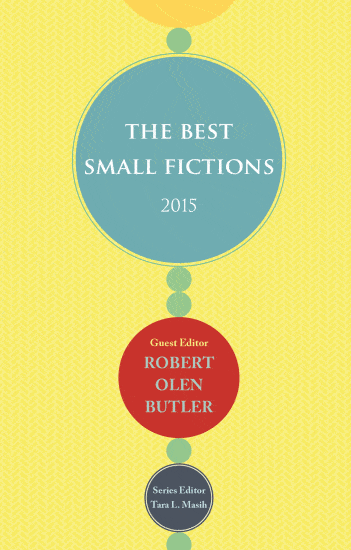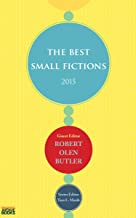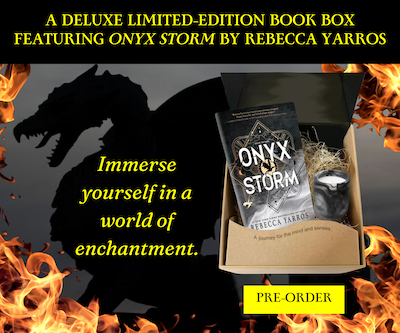Best Small Fictions 2015 by Tara L. Masih, Robert Olen Butler
Super-short stories—variously named flash fiction, haibun or iStories—have exploded in popularity. Where should newbies start? With Best Small Fictions 2015 (Queen’s Ferry Press, October 6), the inaugural volume of a new series edited by Tara L. Masih. From 105 finalists, guest editor Robert Olen Butler chose 55 winning stories, all under 1,000 words.
Unsurprisingly, the stories vary wildly in subject matter, from 19th-century duels to a child of 1980s hip-hop who feels irrelevant as the millennium turns. The authors also range from established voices like novelist Bobbie Ann Mason and Kelly Cherry, former Poet Laureate of Virginia, to emerging writers who have novels or story collections forthcoming. Readers will be introduced to a wealth of fresh and existing talent.
 In stories this short, titles and first lines carry a lot of weight. One of the best opening lines is from “Before She Was a Memory” by Emma Bolden, in which a mother identifies her daughter’s body in a morgue: “I didn’t recognize her without her head.” In “The Third Time My Father Tried to Kill Me” by James Claffey, the text continues the sentence the title began, with the action unfolding backwards.
In stories this short, titles and first lines carry a lot of weight. One of the best opening lines is from “Before She Was a Memory” by Emma Bolden, in which a mother identifies her daughter’s body in a morgue: “I didn’t recognize her without her head.” In “The Third Time My Father Tried to Kill Me” by James Claffey, the text continues the sentence the title began, with the action unfolding backwards.
These small fictions are strong on shorthand characterization and vivid metaphors. Phrases like “His father was a disco song” or “Working parents. Brother with Down’s syndrome” concisely establish some important facts. “Marriage” by Anna Lea Jancewicz, which is about a waitress left at the altar, perfectly encapsulates her regret over the “dress like a Portuguese man-o-war” and “fifty-six chicken dinners bought and paid for.”
In genre the stories run the gamut from realist evocations of loss to whimsical fantasy—a boy who turns into a bear and a dead office employee who keeps showing up for work. Some of the many memorable characters are Lewis Carroll, micromanaging a theatrical production of Alice in Wonderland; an unemployed young man who connects with a Holocaust survivor over deli meats (“Brisket” by Stuart Dybek); and a woman narrating the aftermath of her murder (“Let’s Say” by Julia Strayer).
There are dozens of stand-outs, but if I had to choose favorites, they would be:
#3: “A Notice from the Office of Reclamation” by J. Duncan Wiley. A public service announcement forbidding the exploration of abandoned mines becomes eerily personal: “We know this urge, know how strong and primal and erotically charged it is.”
#2: “The Lunar Deep” by David Mellerick Lynch. A man slipping into senility turns to astronomical and natural history research. The language in this one is amazing: “as his wits weighed anchor” and “the moon’s frail shirked husk.”
#1: My overall favorite is “Something Overheard” by Yennie Cheung. “You” (thanks to the second-person narration) hear your unapproachable Eastern-European neighbor weeping through the wall and realize you’re not so dissimilar after all.
Short stories are best when they freeze such moments of shared humanity. “A small fiction is a lone wolf of a lie,” as Butler writes in his introduction. “We listen to small fictions like nightsounds from afar.” Discover some haunting voices for yourself this fall.
Buy this Book!
Amazon






